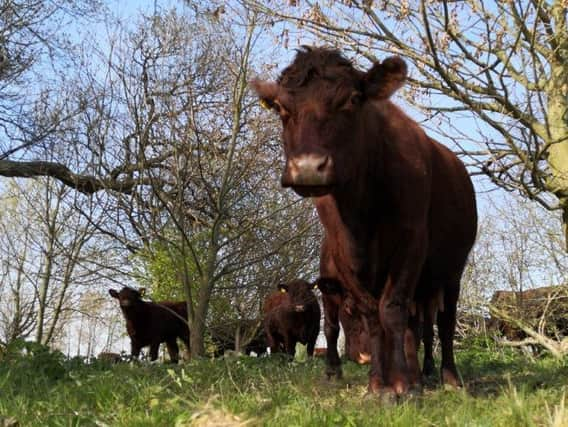Rewilding project brings back nature on Lincolnshire estate


Doddington Hall is unveiling its plans for ‘Wilder Doddington’, a long-term project that will see ecosystem recovery across the entire 770ha estate.
Wilder Doddington is a 100-year project to encourage natural processes to operate at a large scale, and it will result in the development of wood pasture, wetland and species-rich grassland across the previously extensively drained and conventionally farmed arable estate.
Advertisement
Hide AdAdvertisement
Hide AdLow-intensity grazing and browsing of Lincoln Red cattle, and the existing wild deer population will be the main management and habitat creation tool, with wild ponies and pigs to be added in due course.
The result will be that woodlands and other habitats expand and connect, and new habitats are created, producing a huge increase in wildlife and biodiversity; a big reduction in greenhouse gases emitted; lots more carbon locked away in soils and vegetation; better and more resilient soils, better water quality; and reduced flooding, as well as sustainable, organic, pasture fed beef.
Wilder Doddington will also be offering a range of wildlife safaris, tours, guided walks and nature spotting; camping, glamping and self-catering accommodation; new walking and cycling routes; access to Wilder Doddington for education and learning, health, fitness and nature-inspired creative and cultural events; as well as exciting work experience and employment opportunities.
Claire Birch, partner of Doddington Farms said: “I spent my 20s worrying about tropical rainforests, but now I realise that landowners in England can play a big part in addressing climate change and biodiversity decline, and we want to be an exemplar of that. It isn’t just about the large area of land that we are devoting to nature recovery, it is also about all the wonderful people who visit Doddington who can also be part of this journey and hopefully be inspired by it to play their own part in combating the most important issues of our time.”
Advertisement
Hide AdAdvertisement
Hide AdProfessor Libby John, Pro Vice Chancellor of University of Lincoln said: “The University of Lincoln is working with Wilder Doddington to expand the academic outreach and generate research outputs from the project so that the knowledge gained can be published, shared and provide even wider benefits.
"We anticipate that the partnership will produce a regular pipeline of popular opportunities for our students and staff. We would like to see Doddington and Lincoln recognised as a centre of excellence in meeting the demand for future agro-ecological academics, professionals and practitioners, who will be critical for the success and broad adoption of nature-based solutions.”
Paul Learoyd, Chief Executive, Lincolnshire Wildlife Trust, said: “We are excited by the ambition of Wilder Doddington and believe that this landscape scale aspiration has the potential to deliver biodiversity gain of regional significance and to reverse habitat and species losses in the area. Its location close to other important wildlife sites such as Whisby Nature Park, Skellingthorpe Old Wood, Hartsholme and Swanholme SSSI offer great prospects for improving connectivity between sites.”